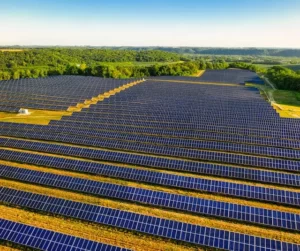A 6 kW system can be sufficient to run a house, but it heavily depends on your specific energy needs and usage patterns. Average homes consume about 29 kWh daily, which means 6 kW might fall short during peak periods when multiple appliances operate simultaneously. To determine adequacy, list your appliances and their wattages, and evaluate seasonal demands like heating or cooling. Energy-efficient appliances can help maintain lower consumption levels. By analyzing your consumption patterns, you can assess if 6 kW meets your requirements. There's more to evaluate when optimizing your energy strategy for greater reliability and efficiency.
Understanding Power Requirements
When considering whether 6 kW is enough to run a house, it's crucial to understand your power requirements. Every appliance and system in your home has specific power ratings, which indicate how much electricity they consume. To determine if 6 kW meets your needs, list all devices and their wattages, then add them up. Don't forget to account for peak usage times, as multiple devices may run simultaneously. Energy conservation is also essential; by using energy-efficient appliances, you can reduce overall consumption and guarantee 6 kW is sufficient. Consider upgrading insulation or using smart home technology to manage energy use effectively. Ultimately, evaluating your unique power demands will guide you in deciding if 6 kW is right for your household.
Average Household Energy Consumption
To determine if 6 kW is sufficient for your home, it's helpful to look at average household energy consumption. On average, U.S. homes consume about 877 kWh per month, translating to roughly 29 kWh per day. This consumption varies based on the number and type of household appliances you use. For example, refrigerators, heating systems, and lighting can markedly impact your overall energy usage. If you run multiple appliances simultaneously, your energy demand could exceed 6 kW, especially during peak hours. Understanding your household's specific energy consumption patterns will help you assess whether 6 kW meets your needs. Evaluating your appliances and their usage is essential to making an informed decision about your energy requirements.
Key Appliances and Their Usage
Understanding key appliances and their energy usage is essential for evaluating whether a 6 kW system can adequately power your home. Each appliance has its own wattage, which affects overall consumption. You should consider your usage patterns, especially during peak hours when demand is highest. Seasonal variations can also change energy needs; for example, air conditioning in summer can cause energy spikes. Device prioritization is vital; prioritize essential appliances like refrigerators and heating systems to avoid outages. Additionally, keep an eye on standby consumption, as many devices draw power even when not in use. Effective power management strategies can help you maximize efficiency, ensuring your 6 kW system meets your household's energy requirements.
Factors Affecting Energy Needs
Several factors can influence your home's energy needs, impacting whether a 6 kW system is sufficient. Your choice of energy sources, like electricity or renewable options, plays a essential role. Usage patterns, such as peak hours and frequency of use, also matter. Lifestyle choices, including how often you cook or entertain, can increase demand. Seasonal variations, particularly in heating or cooling, affect energy consumption considerably. Household size and the number of appliances you use contribute to overall needs. Appliance efficiency is critical; modern, energy-efficient models can lower consumption. Local climate conditions and your energy habits, such as using smart technology to optimize usage, can further adjust your energy requirements. Understanding these factors helps you gauge your energy needs accurately.
Benefits of a 6 Kw System
Choosing a 6 kW system for your home can offer a range of benefits that make it an attractive option for many homeowners. You can enjoy significant cost savings on your energy bills while also reducing your environmental impact. The installation process is straightforward, and with advancements in technology, you can expect high inverter efficiency and system longevity. Plus, you may qualify for government incentives that further ease the financial burden. A 6 kW system also supports grid independence and can be paired with energy storage solutions for added reliability. Maintenance requirements are generally low, allowing you to focus on enjoying your energy savings instead of worrying about upkeep. Overall, a 6 kW system presents an efficient and sustainable choice for your home.
Limitations of 6 Kw Systems
When considering a 6 kW system for your home, it's important to understand its limitations. You might face challenges during peak demand times, which could lead to insufficient power for your needs. Additionally, energy efficiency plays a vital role in how effectively a 6 kW system can serve your household, so it's worth evaluating your overall energy usage.
Peak Demand Challenges
Although a 6 kW system can adequately power many household appliances, it may struggle during peak demand periods. When you experience peak load, energy spikes can occur, especially with appliance overlap—like running your oven and air conditioner simultaneously. Such situations can challenge your system's capacity. Seasonal variations may also influence demand, pushing your 6 kW system to its limits. In these moments, grid dependence becomes evident, as your home relies on external energy sources. To manage these challenges, consider demand response strategies or backup solutions. Additionally, integrating renewable energy sources can help alleviate strain during peak times. Being aware of these factors will empower you to make informed decisions about your energy needs.
Energy Efficiency Considerations
Peak demand challenges highlight the importance of energy efficiency, especially for a 6 kW system. To maximize your energy use, consider energy ratings on appliances and invest in smart appliances that adapt to your usage patterns. Insulation upgrades can markedly improve your home design, reducing energy loss. Incorporating LED lighting can lower your electricity needs, while energy audits help identify areas for improvement. Additionally, focusing on appliance efficiency can guarantee you use less energy without sacrificing comfort. Utilizing renewable sources can further enhance your home's sustainability. Finally, understanding climate impact can guide your choices, guaranteeing your home remains efficient in various conditions. By prioritizing these factors, you can make a 6 kW system more effective for your household.
Comparing Solar Panel Options
Many homeowners are exploring various solar panel options to determine which best suits their energy needs. You'll encounter different solar panel types, each with unique solar efficiency ratings and installation costs. Consider the maintenance requirements and system longevity, as these factors impact your long-term investment. Energy storage solutions can enhance your system's effectiveness, allowing you to utilize stored energy during non-sunny periods. Government incentives may also reduce your upfront costs and make solar more accessible. Additionally, think about the environmental impact of your choice; cleaner energy sources contribute to a healthier planet. By weighing these aspects carefully, you can choose a solar panel system that aligns with your energy goals and budget.
Energy Efficiency Tips
When you're looking to maximize energy efficiency in your home, implementing a few simple strategies can make a big difference. Start with an energy audit, which helps identify areas where you can improve. This assessment can reveal hidden issues, like air leaks and inefficient appliances.
Consider taking advantage of solar incentives to offset the cost of installing solar panels. These incentives can greatly lower your overall expenses while providing renewable energy.
Additionally, use energy-efficient appliances and LED lighting to reduce your consumption. Don't forget to unplug devices when they're not in use, as they can still draw power.
Calculating Your Energy Needs
Understanding your energy needs is essential for determining whether 6 kW is sufficient to power your home. Start with an energy audit to assess your current consumption patterns and identify usage trends. This will help you understand how much energy you use during peak hours. Consider integrating renewable sources like solar panels to supplement your energy supply. Load balancing can also optimize energy efficiency by distributing your usage throughout the day. Think about energy storage options to manage your energy needs effectively. Finally, familiarize yourself with demand response programs, which can help reduce costs during high-demand periods. By carefully evaluating these factors, you can make informed decisions about your home's energy requirements and whether 6 kW will meet your needs.
Making the Right Choice
After evaluating your energy needs, it's time to make the right choice regarding your power supply. You should consider your options carefully, focusing on energy management solutions that fit your lifestyle. If sustainable living is important to you, think about renewable energy sources like solar panels or wind turbines. These not only reduce your carbon footprint but can also lower your monthly bills. Assess your power requirements and choose a system that can handle them efficiently. Consulting with energy professionals can help you determine which options best suit your home. Remember, investing in the right power supply is essential for a reliable, efficient, and sustainable energy future. Make your choice wisely to guarantee comfort and efficiency in your home.
Frequently Asked Questions
How Does Weather Affect a 6 Kw System's Performance?
Weather considerably impacts a 6 kW system's performance. Solar efficiency drops in extreme temperatures, shading effects reduce output, and seasonal variations can lead to fluctuating energy production, affecting your overall energy needs and consumption.
Can I Expand My System if My Needs Increase?
Yes, you can expand your system if your needs increase. Consider system upgrades that enhance energy efficiency. It's important to assess your current setup and plan for future demands to guarantee peak performance.
What Is the Lifespan of a 6 Kw Solar Panel System?
The lifespan of a 6 kW solar panel system is typically 25-30 years. With proper maintenance, you'll enjoy system efficiency and greater energy independence, making it a wise investment for your energy needs.
How Much Maintenance Does a 6 Kw System Require?
A 6 kW system requires minimal maintenance, mainly system upkeep like cleaning panels and efficiency monitoring. You should check connections and perform inspections annually to guarantee peak performance, keeping your solar investment running smoothly.
Are There Financing Options Available for a 6 Kw Installation?
When considering financing options for your installation, you'll find various plans available. Many companies offer loans or leases to help cover installation costs, making it easier for you to invest in your energy needs.
Conclusion
To sum up, a 6 kW system can adequately power a typical household, depending on your specific energy needs and habits. By understanding your power requirements and making informed choices, you can maximize efficiency and minimize costs. It's essential to evaluate your energy consumption patterns and consider factors like appliance usage and energy efficiency. Consulting with a professional can further help you determine if a 6 kW system is the right fit for your home, ensuring reliable and effective energy use.


